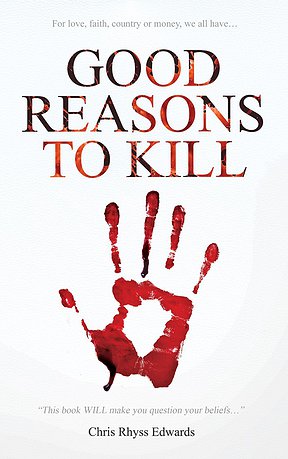★★★★½ 
Good Reasons to Kill is a fascinating and important work that looks at sanctioned murder across the world. Murder is considered immoral, yet there are many instances where it is considered justified: war, the death penalty, honor killings, and many more. A thorough examination of the subject, the book covers dozens of different instances of murder worldwide and how they are justified by different cultures. Depending on one’s perspective, ending someone’s life can either land you on death row or be lauded a hero. As such, Good Reasons to Kill asks many troubling, but vital, questions about the morality of murder.
The prose is polished and thoughtful – as professionally written as any mainstream book. The weakness in the book is that it doesn’t delve into its thesis nearly enough, and acts more like an encyclopedia of sanctioned murder across the world. Not to say it is overly dry – on the contrary, Edwards’ writing is electric and informative. For instance, the section on Trayvon Martin is one of the best summations of the case I’ve yet to see. The issue is that it is merely a summation – we learn about George Zimmerman’s history, and the debate on Stand Your Ground Laws and self-defense, but that is really all Edwards explores. One could make the argument that it’s up to the reader to then make his or her own conclusions, but the conclusion one makes is somewhat rudimentary: people justify murder worldwide.
What does that mean? That murder is justifiable? That death isn’t that big a deal? What’s clear is that for every person, death is a gray area. Someone who vehemently opposes the death penalty may be pro-choice. The vice versa is also very common. We all have different moral systems. So who’s right? Edwards doesn’t propose an answer, but merely says that murder is in the eye of the beholder. That doesn’t seem to go far enough.
The book would have been better served if it was more of a philosophical or ethical treatise. The fact that honor killings are justified by a subset doesn’t tell us a lot. Terrorists also feel justified for what they do, and that says nothing about the morality of terrorism. Basically, there are two sides to every issue, whether its the death penalty, euthanasia, war, or anything else. Some people find it immoral, some find it justified, which isn’t entirely an eye-opening observation. As Edwards continually stresses, justification for murder is a matter of perspective.
So the book needed more of Edwards’ own perspective, and to tie all the stories together: what are the societal factors that lead to justification? Are there similarities in outlook across cultures? For example, are there any similarities between those who support honor killings in India and those who support the death penalty in the U.S.? Is religion a common bond – is the lack of religion another one? Without connecting those dots, what we’re mainly left with is a compendium of people being horrible to each other, without attempting to uncover why that may be the case.
That said, these are all thought-provoking and deeply important issues. It cannot be stressed enough how well-written and informative each chapter is. It is because the book is such a good framework that I was left wanting more. Edwards is a terrific writer, as well as a stellar archivist of other people’s experiences – such as a powerful story about witnessing infanticide in China. There is a lot to be learned here about how death is handled worldwide, which makes the book intensely fascinating and illuminating – it just needed to expand on its thesis. There’s a huge amount to recommend in this book.
Links
Good Reasons to Kill.com
Amazon
Goodreads
Review Overview
Design
Editing
Content
Get an Editorial Review | Get Amazon Sales & Reviews | Get Edited | Get Beta Readers | Enter the SPR Book Awards | Other Marketing Services























Leave A Comment